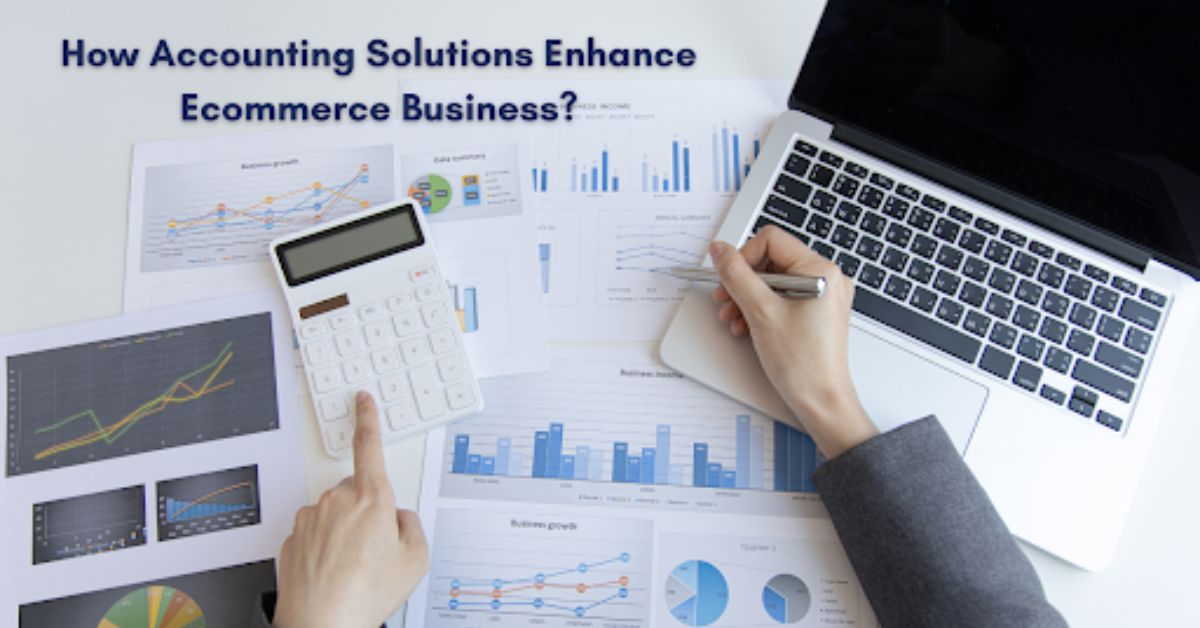Do you need help tracking your finances in your ecommerce business? The fast-paced world of ecommerce can be overwhelming when managing finances. From managing the cost of inventory to payment processing, every detail needs precision and efficiency.
That’s where accounting solutions come in, providing tools to streamline financial management and help businesses thrive in a competitive landscape.
Streamline Financial Processes
Accounting solutions finally streamline financial workflows; these platforms automate repetitive tasks, such as data entry, invoice generation, and payment tracking, freeing time for business owners. Automation reduces human error, therefore potentially increasing the reliability of financial records.
Ecommerce businesses are facing diverse and complex transactions daily. It could be managing multi-currency payments or dealing with variable tax regulations. Accounting solutions make it simple. Financial data is consolidated in one place, providing a real-time overview of cash flow, accounts receivable, and accounts payable.
Better Inventory Management
Inventory is the heart of ecommercebusinesses, and its management is crucial to success. Accounting solutions that have integrated inventory management enable businesses to track stock levels, orders, and costs.
For example, sophisticated accountancy software can track stock information against the financial records and hence give an accurate account of the inventories at any time. Such helps avoid problems like overstocking, keeping cash stuck in excess, or understocking, where sales will be missed. Others send signals when the stock levels have fallen to a certain limit, which ensures that reorders are timely.
These tools also help analyze the cost of goods sold, which enables businesses to set proper pricing strategies. With better visibility into inventory and financials, ecommercebusinesses can optimize their operations and meet customer demands efficiently.
Simplified Tax Compliance

Tax compliance is a daunting challenge for most ecommercebusinesses, especially those that operate in different regions with varying tax laws. Accounting solutions simplify this by automating tax calculations, ensuring accuracy, and reducing the risk of penalties.
Most modern accounting software has integrated tax management that can be updated to accommodate several local and international tax codes. These tools assist with detailed tax reporting, making return filing easier while ensuring businesses stay compliant. Automated processes during the peak tax season reduce administrative burdens, which allows the business owner to focus on core activities.
Accounting solutions also ensure the financial integrity of a business by ensuring the accurate reporting of taxes. This helps in avoiding legal troubles and building trust among customers and stakeholders, as they appreciate transparency and reliability.
Better Financial Insights
In the ecommerceindustry, where trends change very fast, real-time financial insights are critical. Accounting solutions provide dashboards, analytics, and reports that help businesses track key performance indicators such as revenue, profit margins, and customer acquisition costs.
For example, businesses can use these insights to identify their most profitable products, enabling them to prioritize and promote these items. Similarly, understanding customer purchasing trends can inform inventory decisions and marketing strategies. By highlighting areas of strength and weakness, accounting tools empower businesses to make data-driven decisions that boost performance and profitability.
It also brings transparency to the financial report of the business, which is vital in attracting investors or availing loans. A good financial report instills confidence in the stakeholders, portraying the business as being run efficiently and ready for expansion.
Ease of Integration with ecommercePlatforms
Most accounting solutions are easy to integrate with the most popular ecommerce platforms, ensuring that there’s always a smooth flow of financial data between the systems. This would avoid the need for frequent manual transfer of data and reduce errors.
For example, sales data from an ecommerce platform can automatically be synced with accounting software. This integration streamlines processes such as revenue tracking, expense management, and inventory updates. Businesses can use these integrations to also manage refunds and returns, maintaining customer satisfaction.
The benefits of scalability are also presented. With the expansion, accounting software adapts to accommodate greater transaction volumes, new sales channels, and international operations. The financial infrastructure therefore grows along with the business.
Better Customer Experience
Accounting solutions indirectly, but considerably, contribute to better customer experience. In a scenario where financial processes and inventory management are streamlined, a business can therefore offer faster shipping, correct product availability, and competitive pricing.
For example, fast payment processing eliminates delays and facilitates smooth transactions, which creates customer confidence. Similarly, better control of the inventory prevents situations in which customers face a stockout or delayed delivery. Managing the backend effectively renders a better customer-facing experience that fosters loyalty and encourages repeat purchases.
The alignment of operational efficiency with customer needs will help an ecommerce business differentiate itself in a crowded market. A seamless customer experience satisfies, but also turns customers into advocates for the brand.
Scalability and Growth
As ecommerce businesses grow, so do their financial needs. Manual processes that might have been adequate for a small operation may no longer suffice when transaction volumes increase or when the business expands to new markets. Accounting solutions are built to scale and offer advanced features that can support growth.
Scalable accounting tools, for instance, provide multi-currency support, making it easy for businesses to manage international transactions. It also offers features such as automated tax compliance for global operations, thus making it easier to handle complex regulations.
Investing in strong accounting software helps ensure that the financial management processes remain efficient and flexible. In this way, they prepare themselves to handle growth challenges without compromising operational quality or financial accuracy.
Cost Savings and Efficiency
While accounting solutions require an investment at the front end, savings on the back end can be quite significant. This reduces the need for overtime employees to manage bookkeeping and accounting tasks. There is also a reduction in errors, which can prove expensive to correct.
Effective financial management enables businesses to better use resources. For example, businesses can now divert resources that are used for unfruitful overspending into productive high-impact areas like marketing or product development. All these savings contribute directly to improving profitability.
Moreover, accounting solutions make ample time for business owners and workers to focus on strategic business activities rather than administrative ones. The overall efficiency that these tools create provides a more concrete basis for long-term success.
Data Security
Managing financial information involves the responsibility for its safety. Accounting solutions, therefore, ensure that the data is protected through features such as encryption, secure cloud storage, and backup. These measures protect businesses from data breaches and cyber-attacks.
Secure platforms also boost customer confidence, especially if they involve payment processing. Knowing their financial information is safe motivates customers to complete transactions and continue supporting the business.
Another advantage of secure accounting tools is compliance with privacy regulations. A business can avoid legal issues and penalties while demonstrating its commitment to ethical practices, thus earning the trust of customers, donors, and stakeholders.
Conclusion
Accountant solutions are fundamental to ecommerce businesses as they provide varied benefits for the management of finances and other operations within the company. From helping in the running of different processes to ensuring proper and efficient management of the products, accounting can help maintain tax compliance besides providing workable insights, which directly helps to eliminate the different challenges in e-commerce.
FAQs
- How do accounting solutions streamline financial processes for e-commerce?
They automate tasks like invoicing, payment tracking, and data entry, reducing errors and saving time.
- Can accounting solutions handle multi-currency transactions?
Yes, many tools support multi-currency features, making it easier to manage international sales.
- How do accounting tools improve tax compliance for ecommerce businesses?
They automate tax calculations, generate detailed reports, and ensure adherence to local and international tax laws.











